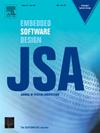Configuration-aware approaches for enhancing energy efficiency in FPGA-based deep learning accelerators
IF 3.7
2区 计算机科学
Q1 COMPUTER SCIENCE, HARDWARE & ARCHITECTURE
引用次数: 0
Abstract
In the rapidly evolving domain of the Internet of Things (IoT), this study focuses on enhancing the energy efficiency of Deep Learning accelerators implemented on FPGA-based heterogeneous platforms aligned with the principles of sustainable computing. Diverging from the conventional focus on the inference phase, this research introduces innovative optimizations aimed at minimizing the overhead associated with the FPGA configuration phase. Our investigation achieved a remarkable 40.13-fold reduction in configuration energy each time the FPGA is powered on through precise fine-tuning of configuration parameters. Furthermore, the implementation of our Idle-Waiting strategy significantly reduced the overall energy consumption across requests. Under scenarios with regular request periods, the enhanced Idle-Waiting strategy augmented with power-saving methods, outperforms the traditional On-Off strategy in duty-cycle mode for request periods extending up to 499.06 ms. This enhancement is most pronounced at a 40 ms request period, where it increases the system’s operational lifetime by a factor of 12.39 within a 4147 J energy budget. Additionally, this paper introduces an adaptive strategy switching approach to manage scenarios with irregular request periods, employing both predefined and learnable threshold methods. This approach is not only more consistently stable than single-strategy methods but also generally outperforms them. Within this approach, our learnable threshold experiences only a 10% performance drop compared to the future-aware strategy and is at least 6% better than using single-strategy methods. These results underscore the significant potential for deploying more energy-efficient and sustainable systems within IoT applications. Future research will explore the application of these power-saving techniques to a broader spectrum of tasks on diverse FPGA platforms.
在基于fpga的深度学习加速器中提高能效的配置感知方法
在快速发展的物联网(IoT)领域,本研究的重点是提高基于fpga的异构平台上实现的深度学习加速器的能源效率,并与可持续计算原则保持一致。与传统的对推理阶段的关注不同,本研究引入了旨在最大限度地减少与FPGA配置阶段相关的开销的创新优化。我们的研究通过对配置参数的精确微调,使FPGA每次上电时的配置能耗显著降低了40.13倍。此外,我们的Idle-Waiting策略的实施显著降低了请求之间的总体能耗。在有规则请求周期的场景下,增强的空闲等待策略与节能方法相结合,在占空比模式下,当请求周期延长到499.06 ms时,其性能优于传统的On-Off策略。这种增强在40 ms的请求周期内最为明显,在4147 J的能量预算下,系统的运行寿命增加了12.39倍。此外,本文还引入了一种自适应策略切换方法来管理具有不规则请求周期的场景,该方法采用预定义和可学习的阈值方法。这种方法不仅比单一策略方法更稳定,而且通常优于单一策略方法。在这种方法中,与未来感知策略相比,我们的可学习阈值只下降了10%,比使用单一策略方法至少好6%。这些结果强调了在物联网应用中部署更节能和可持续系统的巨大潜力。未来的研究将探索这些节能技术在不同FPGA平台上更广泛任务中的应用。
本文章由计算机程序翻译,如有差异,请以英文原文为准。
求助全文
约1分钟内获得全文
求助全文
来源期刊

Journal of Systems Architecture
工程技术-计算机:硬件
CiteScore
8.70
自引率
15.60%
发文量
226
审稿时长
46 days
期刊介绍:
The Journal of Systems Architecture: Embedded Software Design (JSA) is a journal covering all design and architectural aspects related to embedded systems and software. It ranges from the microarchitecture level via the system software level up to the application-specific architecture level. Aspects such as real-time systems, operating systems, FPGA programming, programming languages, communications (limited to analysis and the software stack), mobile systems, parallel and distributed architectures as well as additional subjects in the computer and system architecture area will fall within the scope of this journal. Technology will not be a main focus, but its use and relevance to particular designs will be. Case studies are welcome but must contribute more than just a design for a particular piece of software.
Design automation of such systems including methodologies, techniques and tools for their design as well as novel designs of software components fall within the scope of this journal. Novel applications that use embedded systems are also central in this journal. While hardware is not a part of this journal hardware/software co-design methods that consider interplay between software and hardware components with and emphasis on software are also relevant here.
 求助内容:
求助内容: 应助结果提醒方式:
应助结果提醒方式:


